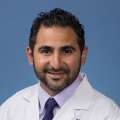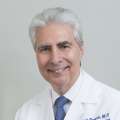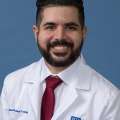Clinical Update
UCLA Fertility and Reproductive Health Center
By providing a comprehensive set of fertility services tailored to individual goals and circumstances, the UCLA Fertility and Reproductive Health Center serves as a critical resource for a growing pool of potential patients. In September, the center moved into dedicated new space across from UCLA Santa Monica Medical Center — a move that has enhanced the capacity of the center’s team of reproductive endocrinologists and skilled nurses to offer collaborative and compassionate care at a clinic exclusively for fertility patients.
“We look at each patient as an individual and collaborate with them to determine the best approach to their fertility treatment,” explains Kathleen M. Brennan, MD, associate clinical professor in the UCLA Department of Obstetrics and Gynecology and a reproductive endocrinology and infertility specialist at the center. “Our physicians and nurses are also very hands-on, both in the care we provide and in supporting our patients through what can be a trying process.”
The center leverages the breadth of expertise both within the UCLA OBGYN department and throughout the UCLA Health system, maintaining close communication with all members of the team. That has contributed to success rates for patients seeking to become pregnant that are among the highest in the nation. “We tell our patients that our goal is not just to get them pregnant, but to have a healthy mother and baby,” says Zain Al-Safi, MD, associate clinical professor of OBGYN and a reproductive endocrinology and infertility specialist at the center. “Because so many of our patients are very complex medically, we work closely with our maternal-fetal medicine colleagues to ensure that patients are optimized prior to becoming pregnant, so that we can have the best possible maternal and fetal outcomes.”
The number of people who can benefit from the center’s services is significant. Infertility affects approximately 15% of the population. Although that percentage has remained steady for decades, more women than in the past are choosing to delay childbearing, and thus are prone to age-related fertility issues. Moreover, advances in fertility treatment and preservation strategies at leading centers such as UCLA’s have expanded options and improved chances for success. Whereas many fertility programs focus on one clinical service, such as in vitro fertilization (IVF), the UCLA Fertility and Reproductive Health Center sees the full gamut of cases and provides a range of services, including infertility evaluations, and other treatment options in addition to IVF, such as controlled ovarian stimulation with or without intrauterine insemination (IUI), use of donor gametes, and utilization of gestational carriers. The reproductive endocrinologists at the center also perform surgeries for conditions that affect fertility.
Advances in egg-freezing technology have led to a substantial rise in fertility preservation efforts over the last decade-plus. Egg, sperm, and embryo cryopreservation are being used more frequently than in the past. Dr. Brennan notes that this is an important option not only for individuals looking to delay childbearing while avoiding age-related fertility decline, but also for patients with a diagnosis for which treatment could negatively affect their gonadal function, such as cancer; as well as for transgender individuals seeking to freeze their eggs or sperm prior to gender-affirming therapy.
IVF treatment has higher success rates with improved stimulation protocols, and advances in egg-freezing techniques have led to better outcomes using frozen embryo transfers than fresh transfers, Dr. Al-Safi notes. “We have safer stimulation protocols that have resulted in higher rates of embryos developing, and preimplantation genetic testing allows us to select an embryo that is chromosomally normal, which has resulted in higher pregnancy rates per transfer,” he says.
The routine use of preimplantation genetic testing represents another major advance over the last decade, Dr. Brennan adds. Most patients choose to screen embryos for aneuploidy (PGT-A testing) before implantation. Embryos can also be tested prior to the transfer for monogenetic/single gene defects (PGT-M testing) if the patient or their partner has a known hereditary condition.
The center’s specialists contribute to improved fertility and reproductive care through wide-ranging studies that assess, for example, the potential for adjustments to treatment protocols and changes within the embryology lab to produce better outcomes. The research ranges from basic studies in the laboratory on polycystic ovary syndrome and metabolic dysfunction to research with industry partners on outcomes associated with preimplantation genetic testing.
Drs. Brennan and Al-Safi note that there continue to be common misperceptions about infertility and its treatment. On the one hand, many assume that IVF involves an intensive, multi-month process, when in actuality it is no more than two weeks for the stimulation, followed by the simple embryo transfer the ensuing month. Many also ascribe more power to infertility specialists than they have. Dr. Al-Safi points out that while IVF treatments can increase the chances of pregnancy, the success rate is still affected by the patient’s age. Adds Dr. Brennan: “We use our knowledge to help patients overcome difficulties with conception, and while we can test for chromosomal abnormalities with 97% accuracy, there could still be a congenital anomaly that we cannot detect by available testing.”
Many so-called remedies for infertility that are peddled in the public sphere have no proven benefit, and some can actually cause harm. Drs. Brennan and Al-Safi strongly recommend that anyone concerned about their fertility visit the center for a consultation — either after 6-12 months of not becoming pregnant with unprotected intercourse, or if they have another known issue affecting their reproductive system, such as a history of irregular periods. “There is a lot of information out there that’s not accurate, and part of our job is to dispel those myths,” Dr. Brennan says. “We practice evidence-based care, which improves outcomes and reduces costs. And we take great pride in having among the best results in the country.”
The center has achieved national recognition by Newsweek ranking highly in their 2024 annual America's Best Fertility Clinics survey.




